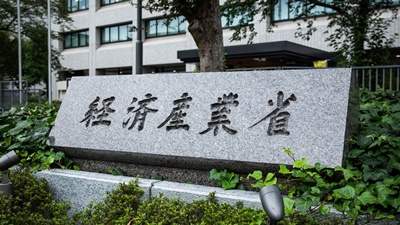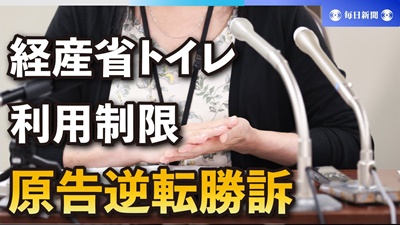
経済産業省Ministry of Economy, Trade and Industry (METI)に勤めるトランスジェンダーの職員が、職場の女性用トイレの使用を制限されているのは不当だとして国を訴えた裁判。最高裁は高裁の判決を覆しました。
In a landmark decision, the Supreme Court said it was unlawful to restrict the use of bathrooms by a transgender woman, overturning a lower court ruling.
※landmark〔決定などが〕重大な、重要な/画期的な出来事 ➾epock-making

判決は満場一致。性的マイノリティーの職場環境に関して最高裁が判断を示したのは初で、今後に影響があると思われます。
The ruling — a unanimous decision by the five judges on Third Petty Bench(第三小法廷)— marks a significant step forward for the working conditions of transgender people, and could affect how companies and government ministries handle similar cases in the future.

戸籍は男性の原告は、入省後に性同一性障害gender identity disorderと診断され、女性として生活していますが、性別変更に必要な性別適合手術は受けていません。※写真は毎日新聞から
The plaintiff is an economy ministry employee in her 50s who is registered as a male on her family registry but lives as a female. She was diagnosed with gender dysphoria(性別違和感) in around 1999, and she later informed the ministry about her condition.
Due to health reasons, she has not undergone sex-reassignment surgery.(性別適合手術「からだの性別」を「心の性別」に合わせる手術)
→transsexual surgery
※undergo〔治療などを〕受ける
※reassign再び割り当てる
女性の服装での勤務は認められましたが、離れた階のトイレを使うよう制限され、人事院に救済を求めたところ却下。男性は差別にあたるとして訴訟を起こしていました。
She was required to use the women‘s restrooms at least two floors away from her workplace for the purpose of “avoiding problems with other female employees.”
The employee then filed a request to improve the situation to the National Personnel Authority, a Japanese administrative agency that protects the rights of civil servants but was rejected.
In 2015, the plaintiff filed a suit against the government, arguing that being banned from using certain toilets constitutes discrimination.
現在の法律では、性同一性障害の人が戸籍の性別を変える際、生殖機能をなくす手術が必要です。
Under Japan’s Gender Identity Disorder Special Cases Act(性同一性障害特別対策法), transgender individuals must undergo invasive surgeries – including sterilization– to be legally recognized according to their gender identity.
※invasive surgery侵襲的手術
※sterilization殺菌、消毒、滅菌/不妊にすること、避妊手術


